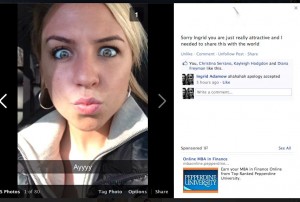A November 2012 study found that 98% of 18-24 year olds use social media. The same study determined that Americans, on average, spend about 7.6 hours per month on online social networks.
Quickly scroll down your newsfeed and you could hazard a guess; we, as college students, are spending a lot more than just 7.6 hours a month on Facebook. Statistics show most of us check our Facebook first thing in the morning, and for a lot of us, it’s before we even get out of bed. We check it during lecture as we pretend to type our notes, we check it on our iPhones to avoid the awkward glance of a stranger on the bus, and we check it on those unfortunate occasions in which we’re forced to do something–anything–alone. (God forbid we’re caught solo in the dining hall without some sort of a screen to gaze at mindlessly.)
All this time spent online is not without ramifications for our mental and emotional health.
With our expert use of Facebook, college students have become pseudo-PR professionals, carefully managing our online personas. Social comparison theory states that we look to the lives of others to determine whether ours are successful or not. Your newsfeed would have you believing your friends have the coolest clothes and the most high profile internships, that they save the lives of children in third world countries, take exotic vacations and attend only the best parties. These impeccably maintained profiles are unrealistic depictions of the lives of our peers. Comparing ourselves to these figuratively (and often literally) Photoshopped lives is a recipe for lowered self esteem. A University of Houston study linked Facebook usage to depressive symptoms, most acutely in young men. The fragile self-images of college students, also the most common social network users, are most likely to take the hardest blow.
Dating sites like OKCupid, Match, eHarmony, and Plenty of Fish offer up cold, hard rejection in the form of unanswered messages and advances. Expansive online profiles detailing interests, religious affiliations, and thoughts on important moral issues are supposed to alleviate shallow motivations. When it really comes down to it, however, online dating trains us to be “picky” and “unrealistic,” and forces us to suffer self esteem-shattering regular rejection, and the studies back this up.

Still other self-esteem killers and mood-depressors trap up our technology usage. There are those days when we’re scrolling down our newsfeed and happen upon the attractive new profile picture of that dreamboat we’ve been pining after–with his new girlfriend. There’s that ex-girlfriend whose sporadic status updates toss salt on scarcely healed wounds, and the Facebook conversations that lay dormant in our inboxes, material for us to relive entire relationships.
Text messages are another medium by which we relive our relational missteps. We reread the double, and triple texts we sent to no reply to what’s-her-face. If we’d only added one more ‘y’ to that ‘hey,’ or waited thirty more minutes before hitting send… might it have ended differently?
Your choice of greeting or delay in response probably didn’t make a difference. He was going to respond, or he wasn’t (not to get all “He’s Just Not That Into You”). But the permanence of your perceived “mistake,” stored there on your phone, isn’t helpful.
The permanence of our blunders on the Internet can be not only catastrophic to our careers, as we’ve been told by so many professors and career counselors, but to our senses of self. We may have forgotten about that time we passed out with our shoes on, but Facebook hasn’t.
All of these mini-blows to our egos add up. Facebook even acknowledged this. In early November 2012, the site posted to its official page: “Birthday cakes are made for people to be together. They give friends a place to gather and celebrate. But too much cake probably isn’t healthy. So birthday cake is a lot like Facebook.”
Technology and social media, it seems, have acknowledged their contribution to our unfortunately delicate self-images. They have responded with more technology and social media.
“Disposable” social media makes it impossible, or at least more difficult, to archive shared content, meaning you don’t have to relive your choice of “hey” vs. “heyy” over and over till you hear from her again. The most popular disposable social medium of the present is Snapchat. Snapchat allows users to share photos with a time limit. Recipients are allowed to view the image, and optional paired text, for between 3 and 10 seconds before it self-destructs. The disposability of these messages is, of course, a fallacy. Users can easily take a screenshot of the Snapchat (although the sender will be notified). Hacks and online tutorials have popped up that teach you how to bypass the screenshot notification. Snapchat is convenient for “sexters” who want to be sure their nude pics don’t go viral. The time limit and disposability mean we’re less self conscious, more likely to share realistic or silly snapshots of ourselves. The disposability is a façade, but it’s a fun one to believe in. (In one case, one of my friends took a screenshot of my silly snapchat and posted it to Facebook–completely defeating the purpose of “self destruction.” These are the risks we take in believing any of our technological activity is private.)
Facebook has even unveiled a revamped version of its “Poke” as a response to Snapchat rebuffing its rumored offers to buy the app.
Applications like Tinder have responded to the crippling social rejection of traditional dating websites. The Tinder for iPhone app links to Facebook. It shows users a number of single people around their age and from their geographic area. The only information you are afforded is your number of shared interests and shared friends. The primary basis for hitting the green “like” heart is whether or not you are attracted to their profile photo. Yes, it’s superficial, but users are only notified of their matches, and never of their rejections. You have the option of messaging this person, or not. And conversations can be abandoned at a moment’s notice by blocking the other person. It requires far less image-maintenance than an expansive dating profile. Facebook’s respective response to Tinder was the vulgarly titled app Bang with Friends, which has since been done away with.
Daniel Stuckey of Motherboard hit the nail on the head: “…Tinder isn’t as much about popularity and ranking as it is about making low emotional investments and hooking people up.”
Yale undergrad Sean Haufler recently wrote a piece called “How Snapchat Took Over Yale” that has gained some attention on the web. He described the platform using an emotion-friction ratio, determining a “mass Snapchat” to be high emotion, low friction. He went on to explain:
A Snapchat of a funny face will evoke a visceral reaction in the recipient before they have time to consider the meaning behind the message. Conversely, when someone receives an MMS, the first thing they see is the recipient list. Users immediately dissect mass text messages before experiencing them. To solve this problem, Snapchat is intentionally ambiguous. Since the meaning behind a snap is opaque, Snapchat alleviates senders’ social inhibitions. This is revolutionary: by altering the social dynamics of digital messaging, Snapchat created an atmosphere in which people share more openly.
Outside of the realm of these new disposable social media, however, it seems that the more of us we show to the world, the less confident we are in what we’re showing. These low emotional investments protect us from the pains of social media, and restore it to its original purpose: recreation.
Texts can be deleted, but the bill from the therapist cannot. While choosing disposable and low emotional investment social media can help us preserve our egos, the only surefire way to rid yourself of the Facebook blues is by getting your eyes off your newsfeed and back on the professor’s PowerPoint.



